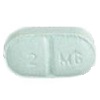
 USA/Canada
USA/Canada 
 UK
UK 
 Australia
Australia 
|
Imodium
Imodium is the antidiarrheal medicine. It binds opioid receptors in the intestine, inhibits the release of acetylcholine and prostaglandins by decreasing peristalsis, increases the time it takes for food to pass through the intestines.
Imodium 2 mg
Drug Name Imodium (Loperamide) DESCRIPTION Imodium is the antidiarrheal medicine. It binds opioid receptors in the intestine, inhibits the release of acetylcholine and prostaglandins by decreasing peristalsis, increases the time it takes for food to pass through the intestines. Imodium increases the tone of the anal sphincter, reducing incontinence chair and urge to defecate. Imodium is used to treat diarrhea, to reduce the amount of feces in patients with ileostomy (surgical diversion intestine through the holes in the stomach). The drug is prescribed for oral administration. For the treatment of acute diarrhea in adults and elderly patients the initial dose is 4 mg, the dose should be reduced to 2 mg after each act of defecation in the case of loose stools. The initial dose of 2 mg is recommended for children over 6 years which may be reduced to 2 mg after each act of defecation in the case of loose stools. Tablets Imodium fairly fragile, so do not click on them through the foil. Before swallowing tablets they should be chewed. Do not take Imodium more than 3 times within 24 hours. MISSED DOSE If you miss a dose, you should take the medication as soon as you remember it. If this happens during your next dose, just skip it and welcome back to your regular schedule. This medicine may not be metered; it can be taken once or twice if necessary. OVERDOSE Overdosed symptoms: dizziness, drowsiness, unusual or infrequent scanty urination, severe stomach cramps, bloating, and vomiting. You may need urgent medical care in some cases of overdose. STORAGE Store at room temperature between 59-77 F (15-25 C), away from light and moisture, children and pets. PRECAUTINORY MEASURES Do not use Imodium if you are allergic to loperamide, or if you have bloody stools or with the mucus, or in case of diarrhea caused by antibiotics. Try to drink more water and diet, you are taking this medication, to avoid dehydration. Improve your state may take up to 48 hours. Tell your doctor if you have hepatic failure, AIDS. Acute dysentery other gastrointestinal infections (caused Salmonella, Shigella, Campylobacter), ileus, diverticulosis, acute ulcerative colitis pseudomembranous enterocolitis (diarrhea caused reception antibiotics) first trimester, lactation, childhood (under 6 years), hypersensitivity to loperamide and or other ingredients. SIDE EFFECTS Side effects may include symptoms of allergies such as hives, rash, swelling of the face and tongue, dizziness, drowsiness, constipation, abdominal pain or bloating, dry mouth, deterioration of health or diarrhea, watery or bloody diarrhea, excessive gas, nausea, vomiting, fever, headache. Stop using this medication and contact your doctor immediately if you experience these symptoms. Tell your doctor if you are taking saquinavir (Invirase), quinidine, ritonavir. The latter two drugs and P-glycoprotein inhibitors, when combined with the use Imodium may cause an increase in plasma Imodium. Saquinavir levels reduced the consumption of Imodium. |
Testimonials
I can hardly believe that I spent so much money on brand drugs. Your generic drugs act the same way the brand ones do but they cost much more cheaper. Thank you. Now I know about your site and will buy again and again.
- Leo Ahlstrom. Read more Why Generic?
Generic is a drug that has proven pharmaceutical, biological, and therapeutic equivalence to the brand name drug. In other words, generic has an absolutely identical content, dosage form and has the same qualities of effectiveness and safety as its branded analog.
Secured by

|















